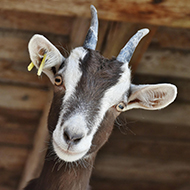
Actiphage can differentiate between vaccinated and infected animals.
A new diagnostic test has shown potential to differentiate between vaccinated and infected animals with Johne's disease.
Previously, vaccination of livestock against Johne's disease, an infectious wasting condition affecting ruminants, has been hindered because there is no diagnostic test that can differentiate between vaccinated animals, and those with the disease (DIVA test).
Researchers have discovered that the Actiphage blood test can differentiate between goats that are naturally infected with Johne's disease, and those with vaccinations.
This discovery suggests potential for a vaccination programme to protect ruminants from the usually fatal disease. While previous tests to detect infection in vaccinated goats did not work, Actiphage detects live bacteria in a milk or blood sample. Because of this, the test is not affected by vaccination status.
Professor Cath Rees, from the University of Nottingham, said: “We have now shown that Actiphage is compatible with a range of different methods for purifying white blood cells, demonstrating the versatility of our test and opening up a number of new applications.”
“This study provides evidence that Actiphage can also be used as a DIVA test, allowing us to differentiate between naturally infected and vaccinated animals; this will support the use of vaccines as part of MAP (Mycobacterium avium subspecies paratuberculosis) control programs.”
Image (C) PBD Biotech



 With Strangles Awareness Week just around the corner (5-11 May), vets are being encouraged to share a survey about the disease with their horse-owning clients.
With Strangles Awareness Week just around the corner (5-11 May), vets are being encouraged to share a survey about the disease with their horse-owning clients.